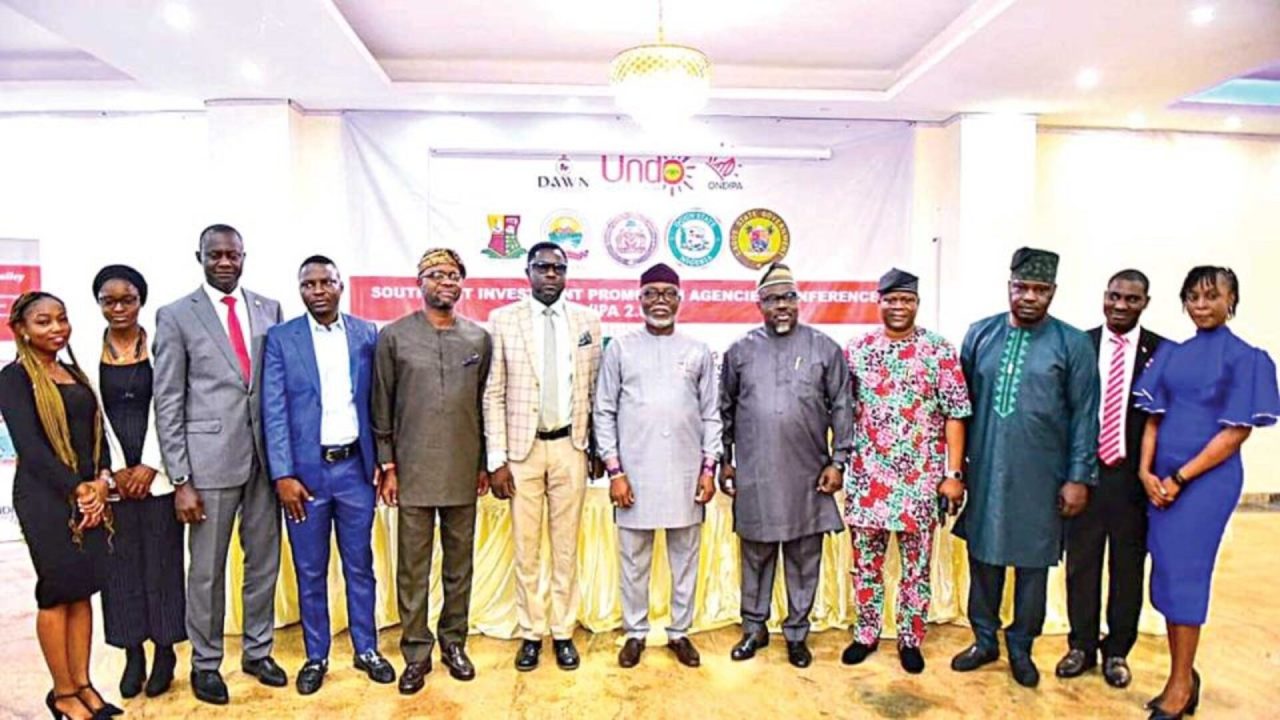Stakeholders across the southwest geo-political zone converged recently in Akure, the Ondo State capital, to highlight what the region stands to gain from the Constitution Review Bills on power and railway recently assented to by President Muhammadu Buhari. They concluded that the new law will accelerate the pace of economic development in the region. HAKEEM GBADAMOSI brings the summary of the event.
Development and economic experts from the southwest region of the country have concluded that the new constitution bills recently assented to by President Muhammadu Buhari, transferring power and railways from the exclusive legislative list to the concurrent list, will create a new wave of business opportunities and economic development in the region, apart from marking an incremental shift towards true federalism.
The summit put together by the Development Agenda for Western Nigeria (DAWN) Commission with the Odu’a Investment Company Limited as a partner, underscored the importance of a joint rail system and power supply in the geo-political zone, which will help to renew and rejuvenate the vision for sustainable development across the six states of the region.
The participants of the two-day summit on Southwest Investment Promotion Agencies (IPA) Conference with the theme ‘Powering South-West for Productivity through Increased Investment in Infrastructure: Power sector/ Rail Transportation’ aimed for the Southwest region to become the preferred place for people to visit, live, work, and invest. They maintained that there is a need to engender regional cooperation and integration as a catalyst for development and facilitate sustainable working relationships. They opined that the new development will allow the region to develop at its own pace, saying the new wave of liberalisation is good for the growth of the country’s economy.
Declaring the summit open, Ondo State governor, Rotimi Akeredolu, tasked stakeholders of the Southwest Investment Promotion Agencies (IPA) to have a meaningful dialogue geared towards the advancement of the region, noting the outcome of the deliberation will no doubt bring about infrastructural and economic development, which will in turn project the region to the international communities.
Akeredolu, represented by his deputy, Lucky Aiyedatiwa, hailed the vision of the DAWN commission for its efforts in bringing states in the southwest to work together in designing common policies. He said, “It is delightful to note that the focus of this conference is on transforming infrastructure, namely: energy and rail transportation.”
He said access to energy will bring about strong development across the region, noting that “we must therefore work together to provide the enabling environment for the private sector to play its role in the provision of this very key infrastructure to our people.
“The rail system will enable our towns and villages to be closer to one another and to the big cities in a quicker, safer, and cheaper way. Food produced in ljero-Ekiti will be fresh on arrival in Lagos; bulk glass from Igbokoda can get to Ibadan with a reduced risk of breakage, and cashew nuts from Iseyin can readily get to the Port of Ondo and onward to the international market.”
The Director-General, of the DAWN Commission, Mr Seye Oyeleye, said the commission had commenced discussions with some foreign investors and partners to link about 44 cities of 667km by rail, and said the development will allow the region to develop at its own pace saying the new wave of liberalisation is good for the growth of the country’s economy.
Oyeleye stressed the need for political officeholders to key into the system and create policies and a strategic framework to ensure the implementation, strengthening of the base and leveraging of the capacity of the national grid.
He disclosed that the commission had been carrying out preparations for the railway project, which will boost the revenue of the states in the region by more than 50 percent despite many encumbrances against it, and said DAWN will create a Community of Practice (CoP) for transport (rail) and energy that will hold a meeting in the next two weeks at the commission’s office.
Speaking on the importance of the conference, the DAWN’s DG said, “If we don’t develop our rail and our energy, within a short time, with a population explosion, even investors will not stay in western Nigeria. Lagos has done a lot, and it has a lot of rail experts now. The five other states don’t need to reinvent the wheel. They should leverage what Lagos has done with the blue and red lines.”
Speaking on the reasons for the emphasis on rail and power, he said that “over the years, we have heard people telling you that farmers cannot move their goods to the market all because of transportation. So, we chose rail and power because we believe that those two things, if we get them right, will be the catalysts for accelerated development in western Nigeria.
“We have already sent a memo to our governors, particularly on rail we now need to set up a Railway Regulatory Authority and now take charge of how we can develop rail in western Nigeria.
“That is why we brought all the IPAs together, and you could see we brought in private sector players to speak here at the conference. We have noted a lot of things they recommended and in the next two or three weeks, they will be landing on the desks of our governors.”
Oyeleye allayed the fear that funding the projects might be a challenge to the states in the region, “Funding, particularly rail in Western Nigeria, should not be a problem. If Niger Delta states can get a company to fund a $15 billion rail to link Niger Delta states, then it shouldn’t be a problem for the southwest, which is the economic capital of West Africa, to attract funding.”
The keynote speaker, Prof. Yemi Oke, while speaking on the commercial and regulatory dynamics of a decentralised power sector and its implications for the Southwest region, called on the government of the region to invest in the power sector, emphasising the indispensability of power and energy in the developmental drive of any nation.
He said the southwest states can consider a number of strategic options for maximising the benefit of decentralisation of the electricity regime in Nigeria, including re-acquisition and refinancing of the power sector, restructuring of DISCOs and GENCOs, local government-based power generation, and captive power generation, among others.
Oke said, “The amendment to the Constitution of the Federal Republic of Nigeria, which was recently signed into Law by President Buhari, has altered the equation of the power sector in Nigeria, and this has serious implications for Southwest states.”
The professor, however, said that “a major constraint, which is the new regime of the decentralised power sector, has now tasked the Southwest States with institutional responsibilities: to generate, transmit, and distribute electricity in respect of areas covered by the national grid as well as in areas not covered by a national grid.”
The Chief Executive Officer of an indigenous transport infrastructure development, Planet Project Limited, Mr. Biodun Otunola, while speaking on the rail transportation system for the region, noted that despite having over 100 companies within the region, spending over N150 billion annually on transport and logistics, the economies of the states are not integrated as a result of the low investments in the region.
Otunola said the region can leverage the ongoing development of the Lagos–Ibadan Railway line to Osogbo by the Federal Government to provide reliable transport connections and said the region only needs to push for the development of the freight rail to spur socio-economic development of the region.
A Nigerian scholar, Mr. Eyo O. Ekpo, while recognising the effort of DAWN, advised the Commission to engage political leaders to facilitate the creation of an enabling environment and strategic plans to ensure a functional grid in mitigating financial costs of power generation and states’ collaboration.
Also, the Commissioner for Energy, Ondo State, said the collaboration will encourage healthy competition and collaboration, the creation of policies and a strategic framework for implementation, the strengthening of the base and leveraging the capacity of the national grid.
In his submission, the Lagos State Commissioner for Energy, Mr Olalere Odusote, stressed the need for states’ collaboration, the filling of infrastructural gaps, and the creation of good policies and strategies capable of creating an enabling environment to the end that power is universally accessible.
At the end of the two-day conference, stakeholders called for energy summit in each state of the region in order to identify challenges, policies and demands and draft policy documents; while the DAWN Commission should be saddled with the responsibility to harmonise the frameworks from each state.


